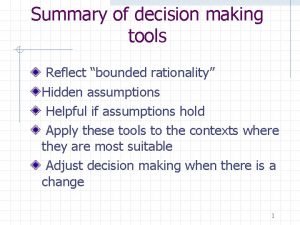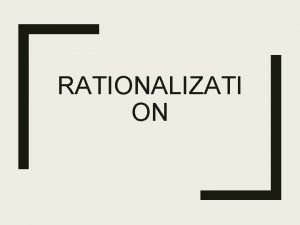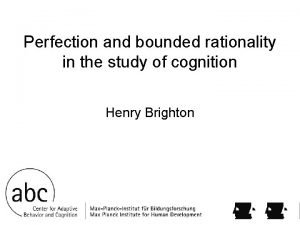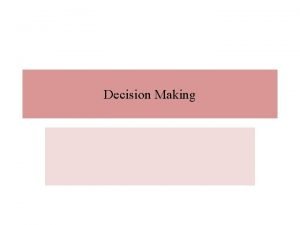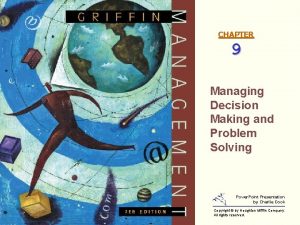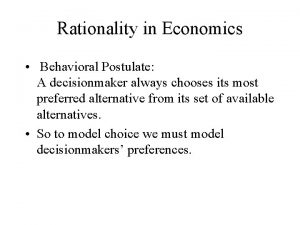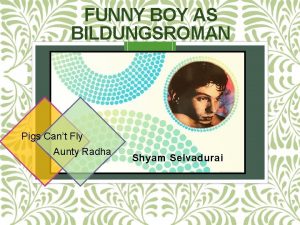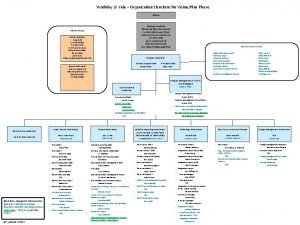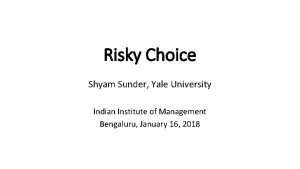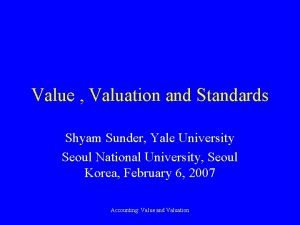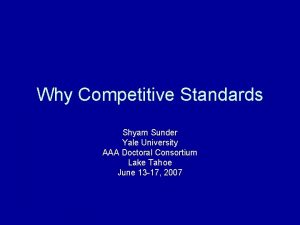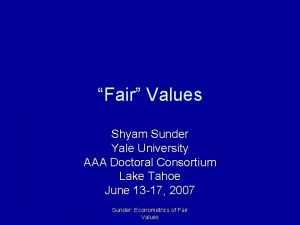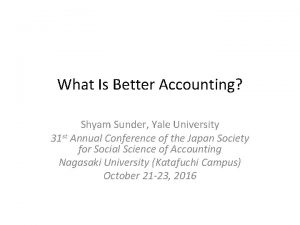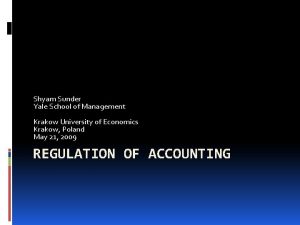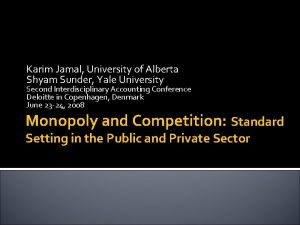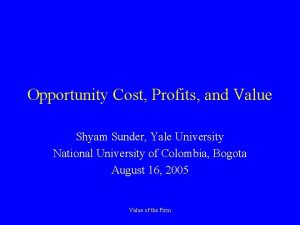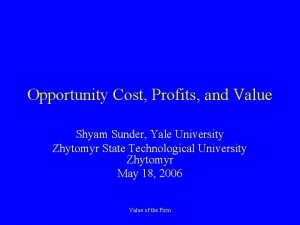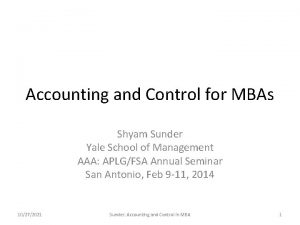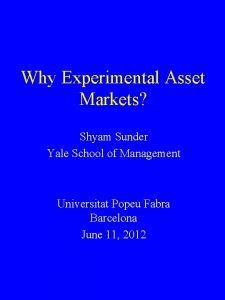Rationality Shyam Sunder Yale University Indian Institute of
















- Slides: 16

Rationality Shyam Sunder, Yale University Indian Institute of Technology, Gandhinagar, Dec. 27, 2017

Write Down Your Questions about Rationality • • What is rational? Math vs. Human rationality A subset of irrationality? Benchmark for rationality?

Meanings • Application of reason and thought to action – Antonyms: unreasonable, unthinking, random • Must reasoning/thinking be perfect? – How about errors, wrong beliefs, wrong models, wrong motivations, wrong goals? • Madness (but method to his madness? ) • Neurosis • Both economics and psychology agree on fact of rationality—people have reasons for what they do; they may differ on what constitutes rationality

Herbert A. Simon • Judgment on whether a behavior is rational is relative to premises about given goals/values, situtatio, and cognitive/computational resources • Economics differs in (a) silence on goals/values; (b) postulating global consistency of behavior; and (c) postulating one world—total environment, present and future • Others (a) empirically determine nature/origin of values, changes with time and experience; (b) how aspects of reality are noticed/postulated as basis for reasoning; (c) determination of computational strategies for using limited resources for reasoning in complex situations; and (d) how non-rational emotions, sensory stimulii influence attention and definition of situation • Economics: focus on choices--substantive; other SSs: processes or procedural rationality • The two coincide when knowledge is perfect and computational ability unlimited

Bounded Rationality • • • A procedural concept Aspiration Action Compare outcome to aspiration If close enough, stop, other wise act again Repeat until stop.

What Is Rational/Reasonable or Understandable? • Giving in to temptation: prepare for exam vs. party; smoking • Refusing to take a remedial course: ignores recommendation to take writing skills because suspects bias • Refusing a reasonable proposal: • Confusing two persons with almost similar names • Failure to identify identical twins • Error of addition in balancing check book • Beliefs in astrology, god, science, morality, induction (future will be like the past), scepticism?

Elements of Rationality/Reasonableness • • • Consistency Conservatism: continuing beliefs without reason to doubt Simplicity Coherence: positive (causation) or negative (absence of incoherence) Theoretical reasoning Practical reasoning Violations of logic, probability theory vs. rationality and reasonableness Irrational or unreasonable: refusal to accept obvious inductions and jump to conclusions on insufficient evidence; frustrating own purposes; or being uncooperative Personal or social (as seen by others)

Two Orders of Rationality • Use, overuse, and misuse • View in context of larger cultural processes that shape our institutions, society, and us • Rationality in the scientific process of economics as an interactive dynamic social process • Two mutually linked orders of rationality: – Constructivist: use of conscious analysis, reason, and logic by individuals and small groups to decide, and – Ecological: complex interactions among deliberate as well as intuitive actions giving rise of aggregate level outcomes and institutions beyond individual self-awareness

Constructivist Rationality • Problem solving by cold calculation and deliberate reasoning • E. g. , designing a bridge after considering terrain, traffic, strength and cost of materials, labor, skills and expertise, budget, etc.

Ecological Rationality Starlings: Birds and the flock • A completed bridge emerges from complex societal interactions among many people who may have diverse goals, information, endowments • Engineering design is one step in this larger process and often includes features not explanable by engineering or economics • Bridge designs themselves have evolved over millennia through complex interactions between man and materials https: //www. bing. com/videos/search? q=starlings+vide o&view=detail&mid=0 E 35 F 76 C 4 C 5 AD 1212406&FORM=VIRE

The Linkage • How are constructivist and ecological rationality linked to each other? • Not susceptible to constructivist analysis • Closer to biological evolution – Role of mutations: actions chosen within or outside bounds of our reason – Some mutations survive the competition for fitness, become incorporated into expectations, beliefs, intuition, rules and institutions that define the setting in which individuals apply constructivist reasoning to decide and act

Human Nature • We suffer more. . . when we fall from a better to a worse situation, than we ever enjoy when we rise from a worse to a better. Security, therefore, is the first and the principal object of prudence. It is averse to expose our health, our fortune, our rank, or reputation, to any sort of hazard. It is rather cautious than enterprising, and more anxious to preserve the advantages which we already possess, than forward to prompt us to the acquisition of still greater advantages. Adam Smith (1959, 1982, p. 213). • Mandeville’s (1705, 1924, 2005) verse: . . . Thus every part was full of Vice, Yet the whole Mass a Paradise; . . .

Write Down Your Answers to These Questions • You get 30 seconds for each answer. • You must write down an answer.

Summary • What is rational, non-rational, and irrational? • How do we count “errors”? • How do we treat decisions made under imperfect or incomplete information? • Level of analysis: individual or social system?

Sources • Gilbert Harmon (1999). Reasoning, Meaning and Mind. • Herbert A. Simon (1986). “Rationality in • Economics and Psychology. ” • Friedrich A. Hayek (1978). “Competition as a Discovery Procedure. ” • Vernon L. Smith (2008). Rationality in Economics: Constructivist and Ecological Forms.

Thank You
 Shyam sunder meaning
Shyam sunder meaning Bounded rationality
Bounded rationality Rationalization sociology
Rationalization sociology Bounded rationality
Bounded rationality Types of decision making
Types of decision making Decision making under bounded rationality
Decision making under bounded rationality Contoh pengambilan keputusan bounded rationality
Contoh pengambilan keputusan bounded rationality A formal organization based on rationality and efficiency
A formal organization based on rationality and efficiency Rational economic
Rational economic Rationality through reasoning
Rationality through reasoning Shyam kishan md
Shyam kishan md Aunty vs boy
Aunty vs boy Four stages of negotiation
Four stages of negotiation Kamran shamaei
Kamran shamaei Diorama investments
Diorama investments Yale university
Yale university Workday yale
Workday yale

